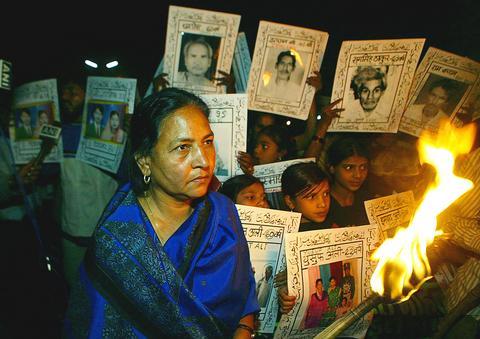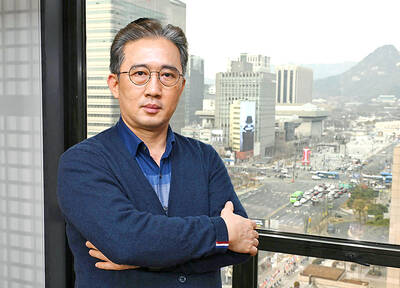Twenty years after a cloud of deadly gas savaged this central Indian city, thousands of demonstrators and survivors marked the anniversary of the world's worst industrial accident yesterday with protests demanding justice for those still suffering.
A leak of 40 tons of poisonous gas from a Union Carbide pesticide plant on Dec. 3, 1984, killed at least 10,000 people in Bhopal and affected more than 555,000 others, although the exact number of victims has never been clear. Many died over the years due to gas-related illnesses, like lung cancer, kidney failure and liver disease.

PHOTO: AP
While millions of dollars in compensation has been set aside, much of the money has been tied up by bureaucratic and legal issues and many people have received little or nothing.
``For the last 20 years I've been visiting the hospital and government offices, begging for compensation to take care of my two children,'' said Leelaben Aherwar, whose baby girl survived the gas leak but immediately afterward began showing signs of mental and physical retardation.
Her son, born a few years later, suffers from similar problems.
``The answer is always the same: 'The court will make a decision.' I don't know what court is this that cannot see our suffering,'' she said yesterday.
So far, she has received about 16,000 rupees (US$360).
US chemical company Union Carbide Corp., which was bought by Michigan-based Dow Chemical Co. in 2001, paid US$470 million in compensation under a settlement with India's government in 1989. But only part of that amount has reached the victims.
Rashida Bee, a disaster survivor who heads a women victims' group, said the protesters would conclude yesterday's rally with a mass pledge to keep up the fight until victims' demands for compensation, medical care and rehabilitation are met.
`They are treating us, the victims, like the culprits responsible for causing the disaster,'' Bee said.
The protesters also called on Dow Chemical to clean up the plant site, where rusted pipes and pesticide storage tanks have collapsed or ruptured in the years since the plant was abandoned after the disaster.
``Lethal chemicals are still lying around at the plant, some in the open. Every time it rains these poisonous chemicals are leaked into the soil, affecting groundwater resources of the area,'' Bee said.
Union Carbide insists the tragedy was due to sabotage by a disgruntled employee and not shoddy safety standards or faulty plant design, as claimed by many activists.
Union Carbide, in a statement sent to reporters, said it spent more than US$2 million to clean up the plant from 1985 to 1994, when it sold its stake in Union Carbide India Ltd. and the local company was renamed as Eveready Industries.
The company also says state studies indicated in 1998 that the groundwater around the plant was free of toxins and that any water contamination was due to improper drainage and other pollution, not Union Carbide chemicals.
The state government took over legal responsibility of the site in 1998, but it has done little to remove the debris and sacks of chemicals. Greenpeace estimates it would cost at least US$30 million to clean up the plant and the groundwater and soil that it claims are laced with carcinogens.
Dow maintains the legal case was resolved in 1989, when Union Carbide settled with the Indian government.
Union Carbide claims that 3,800 people were killed, while Indian officials say up to 15,000 may have died.
Indian officials estimate that nearly 600,000 more have become ill or had babies born with congenital defects over the last 20 years.

VAGUE: The criteria of the amnesty remain unclear, but it would cover political violence from 1999 to today, and those convicted of murder or drug trafficking would not qualify Venezuelan Acting President Delcy Rodriguez on Friday announced an amnesty bill that could lead to the release of hundreds of prisoners, including opposition leaders, journalists and human rights activists detained for political reasons. The measure had long been sought by the US-backed opposition. It is the latest concession Rodriguez has made since taking the reins of the country on Jan. 3 after the brazen seizure of then-Venezuelan president Nicolas Maduro. Rodriguez told a gathering of justices, magistrates, ministers, military brass and other government leaders that the ruling party-controlled Venezuelan National Assembly would take up the bill with urgency. Rodriguez also announced the shutdown

Chinese President Xi Jinping’s (習近平) purge of his most senior general is driven by his effort to both secure “total control” of his military and root out corruption, US Ambassador to China David Perdue said told Bloomberg Television yesterday. The probe into Zhang Youxia (張又俠), Xi’s second-in-command, announced over the weekend, is a “major development,” Perdue said, citing the family connections the vice chair of China’s apex military commission has with Xi. Chinese authorities said Zhang was being investigated for suspected serious discipline and law violations, without disclosing further details. “I take him at his word that there’s a corruption effort under

China executed 11 people linked to Myanmar criminal gangs, including “key members” of telecom scam operations, state media reported yesterday, as Beijing toughens its response to the sprawling, transnational industry. Fraud compounds where scammers lure Internet users into fake romantic relationships and cryptocurrency investments have flourished across Southeast Asia, including in Myanmar. Initially largely targeting Chinese speakers, the criminal groups behind the compounds have expanded operations into multiple languages to steal from victims around the world. Those conducting the scams are sometimes willing con artists, and other times trafficked foreign nationals forced to work. In the past few years, Beijing has stepped up cooperation

The dramatic US operation that deposed Venezuelan president Nicolas Maduro this month might have left North Korean leader Kim Jong-un feeling he was also vulnerable to “decapitation,” a former Pyongyang envoy to Havana said. Lee Il-kyu — who served as Pyongyang’s political counselor in Cuba from 2019 until 2023 — said that Washington’s lightning extraction in Caracas was a worst-case scenario for his former boss. “Kim must have felt that a so-called decapitation operation is actually possible,” said Lee, who now works for a state-backed think tank in Seoul. North Korea’s leadership has long accused Washington of seeking to remove it from power